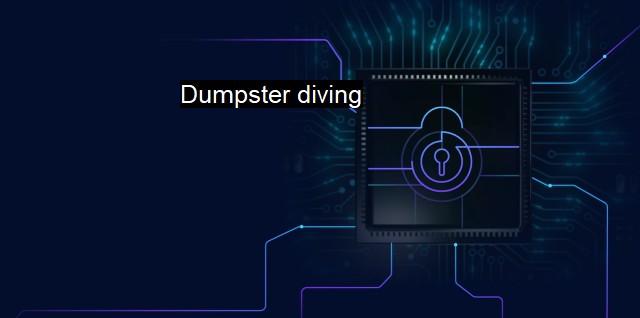What is Dumpster diving?
Dumpster Diving: A Low-Tech Cyber Threat of Our Modern Era
Cybersecurity and antivirus technology have gained prominence due to the rising proliferation of cyber threats. One such prevalent phenomena from a diverse range of security issues is "Dumpster Diving." Although the term originally sprouts from the practice of sifting through trash to acquire potentially useful items discarded by others it is imbued with a significantly malicious underpinning.Dumpster diving in cybersecurity is the unscrupulous act of surreptitiously gathering information by infiltrating dumpster or digital wastes. This tactic has expanded its ambit to include digital trash cans as well, embodying discarded servers, emails, or files deemed as redundant or useless by businesses or individuals. The motive is simple yet diabolical - to exploit any disposed data to launch more heuristic cyber attacks.
Often endowed with social engineering strokes, this technique targets and employs the human factor weakness instead of software or hardware vulnerabilities. The dive can excavate multiple informational nuggets – from outdated financial reports, scrap paper littered with scribbles of door codes and passwords and revealing internal memos, to discarded tech infrastructure. The real peril germinates from abandoned but not entirely 'scrubbed' hard drives, USB drives, or CDs.
These holidaying data mines may inadvertently harbor confidential account numbers, access codes, vital strategic information, credit card data, social security numbers, client lists, and more. Militantly ingenious criminals harnessed the gleaned information to penetrate security walls, masquerade as insiders, blackmail owners, steal identities, or stage elaborate frauds.
In a few strides, Dumpster Diving can cripple an organization, sanitised databases, resilient firewalls, and encrypted networks rendered helpless against an unsuspecting tide of internal attack, borne out of the thoughtless discard.
Antivirus software takes the frontlines in the fight against dumpster diving. Antivirus programs regularly scan and monitor computer systems, striving to detect and deflect malicious programs, which prevent unauthorized access to secure databases or infrastructures while alerting users about potential threats. They can act as a first layer of overwatch, adding plasters over the cracks in the IT armor which could serve as an entry point for these cybercriminals.
Protecting against 'Physical Dumpster Diving' poses a more challenging aspect due to direct human machinations. Here, sensitization and stringent protocols come into play as cyber-vigilantes. From defining a secure disposal and destruction route for confidential data including shredding or incinerating paper documents, pulverising or magnetically de-gauzing old hard drives, proper e-waste management to employee education and training, a panoply of measures needs to be maintained and upheld.
Driving the efforts forward is 'Antivirus Dumpster Diving,' a sophisticated strategy popular significantly in highly critical data environments like banks, defense, or research institutions. this system utilises sets of advanced malware-detection algorithms and

Dumpster diving FAQs
What is dumpster diving in the context of cybersecurity and antivirus?
Dumpster diving refers to the practice of searching through electronic or physical trash to find sensitive or confidential information that can be used for malicious purposes. In the context of cybersecurity and antivirus, dumpster diving often involves searching through discarded computers, hard drives, or other electronic devices to find data that has not been properly erased or destroyed.What are the risks of dumpster diving in the context of cybersecurity and antivirus?
The risks of dumpster diving in the context of cybersecurity and antivirus include the theft of sensitive information such as passwords, financial information, or personal identifying information (PII). Dumpster diving can also allow an attacker to gain physical access to a device, enabling them to install malware or other malicious software that can compromise the security of the device and any networks it is connected to.How can individuals and organizations protect themselves from dumpster diving attacks?
Individuals and organizations can protect themselves from dumpster diving attacks by properly disposing of electronic devices and ensuring that any sensitive or confidential data is properly erased or destroyed before disposal. Electronic devices should be physically destroyed or wiped with specialized software to ensure that all data is properly erased. Organizations can also implement policies and procedures for secure disposal of electronic devices and sensitive data.Is dumpster diving illegal in the context of cybersecurity and antivirus?
Dumpster diving is not always illegal in the context of cybersecurity and antivirus, but it can be considered a form of theft or trespassing depending on the circumstances. Accessing discarded electronic devices or data without permission can be a violation of privacy laws or other regulations. It is important to check local laws and regulations regarding dumpster diving and data privacy before engaging in any such activities.| | A | | | B | | | C | | | D | | | E | | | F | | | G | | | H | | | I | | | J | | | K | | | L | | | M | |
| | N | | | O | | | P | | | Q | | | R | | | S | | | T | | | U | | | V | | | W | | | X | | | Y | | | Z | |
| | 1 | | | 2 | | | 3 | | | 4 | | | 7 | | | 8 | | |||||||